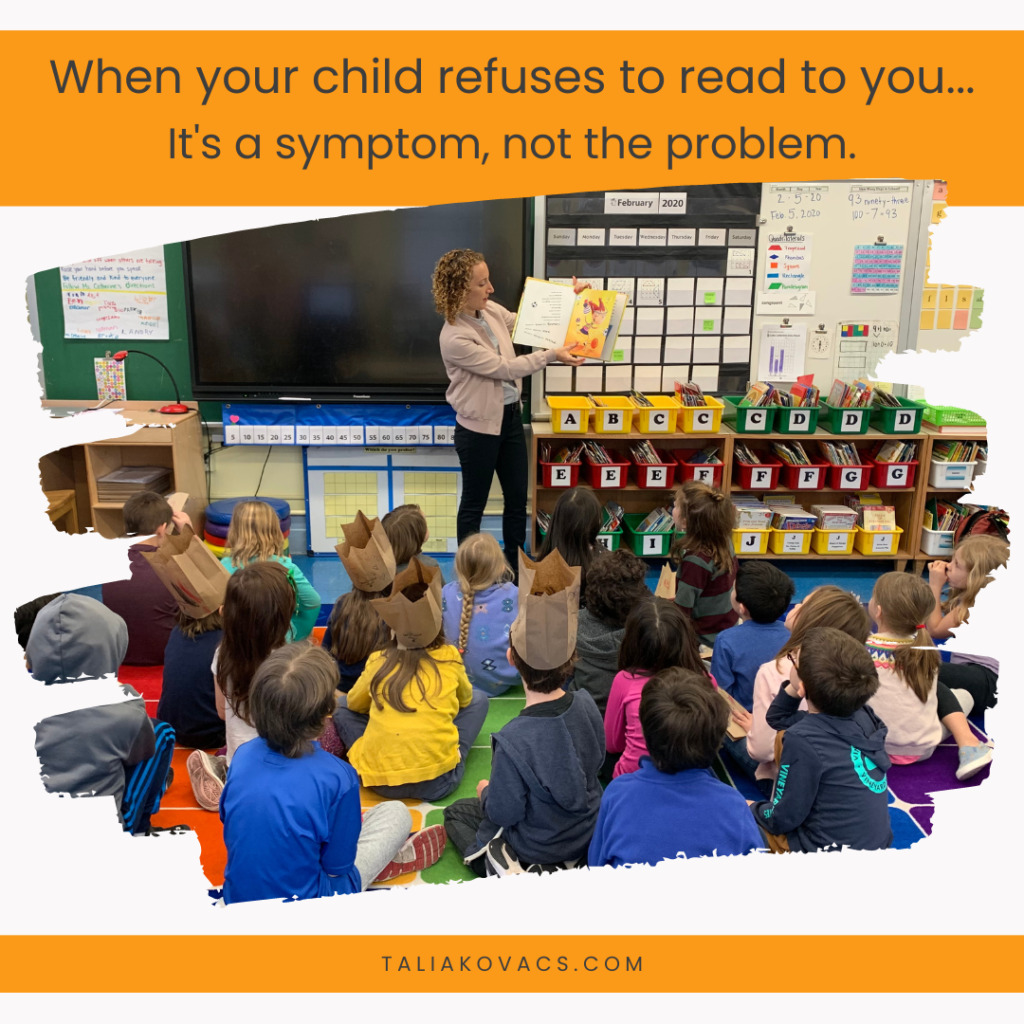[Read a previous post on: Why NOT to teach your child the ABC’s (do this instead]

Often, one of the first things I hear from parents coming to me is, “my child refuses to read to me.”
Their kid has a hard day at school, and they know that when they get home they have reading homework to complete. At this point they do everything they can to avoid it. They distract from the homework, they refuse to take out their reading folder, they tell their parents nothing came home today.
When their parents ask them nicely, in a way that is trying to help, “Will you read to me?” Their child responds with, “No, I won’t” or, complete silence, or sometimes even temper tantrums where they are flailing, yelling and kicking and doing anything to avoid reading.
I have had one student who, for nearly a year before we started working together, refused to read a book to her parents. She even refused to fill in individual words while her parents read to her. This was so hard for her parents. All they wanted was to help her with her reading, but they didn’t know where to start since she wouldn’t even show them her current skill level.
This is so hard as a parent because all we want is what’s best for our kids. We want to be the one to encourage them and show how to fall in the love of reading, and how joyful reading can be. We want to make sure that they don’t fall behind, so of course we’re wanting to support them when we think there’s a problem. This makes it even more frustrating when our children just refuse to even try with us! What you need to know as the parent whose child refuses to read to you is that this is a symptom and not the problem.
The problem is not that they refuse to read to you, the problem is why they are refusing to read to you.
Children at school know when they’re behind. They see themselves doing worse than their peers, and they have language around it. They may say, “Everyone in my class can read, but I can’t!”
Or “my teacher said I’m on a level C (or A, or H, or L).. and everyone else is on a higher reading level.”
Because kids already know this, no matter how encouraging we are at home, you are the main person that your child does not want to fail in front of. You are the main person they are always trying to impress.
So, when you ask them to read to you, even if you ask out of pure love, and help, and kindness.. what they’re saying to themselves is “oh great, here’s an opportunity to embarrass myself in front of my parents. I don’t want to embarrass myself, especially not in front of my parents, so if I don’t read at all, I can’t be embarrassed!”
Refusal of reading is something that often shows up in the beginning of the Resilient Reader Program. The more we work together around the child’s reading skills and building their own sense of resilience, the stronger reader they become. This then leads to them being more willing to show off their new skills to their parents.
So, just know that your child refusing to read to you, is not the problem. The problem is them feeling like they are a bad reader.
There are two parts to helping a child become a stronger reader. First, get help and support for your child. Make sure that they have the reading skills they need. This is not your job as the parent! Your job is to make reading feel like a joyful part of the child’s home life.
The second thing to do as the parent is to make reading feel fun and cozy and warm, and like a joyful part of your child’s home life!
If your child is refusing to read to you and you think it is because they’re lacking reading skills, I recommend reaching out for help. Until you receive that help, please make reading cozy and fuzzy and warm and joyful at home. This is something only you can do as the parent, and any focus on skills at home without proper support can actually backfire.
I recommend reading with your child before bed, picking up books at the library together. Just reading to them, without the pressure of them reading to you. Many kids will spend hours listening to their parents read, but totally clam up when they’re asked to read out loud. If that’s your kid, just read to them. Go back to basics and let reading feel like the warm safe space that you want it to feel for the whole rest of their lives. Reach out for help with their skills, and the rest will follow.
SUBSCRIBE TO THE NEWSLETTER BELOW: